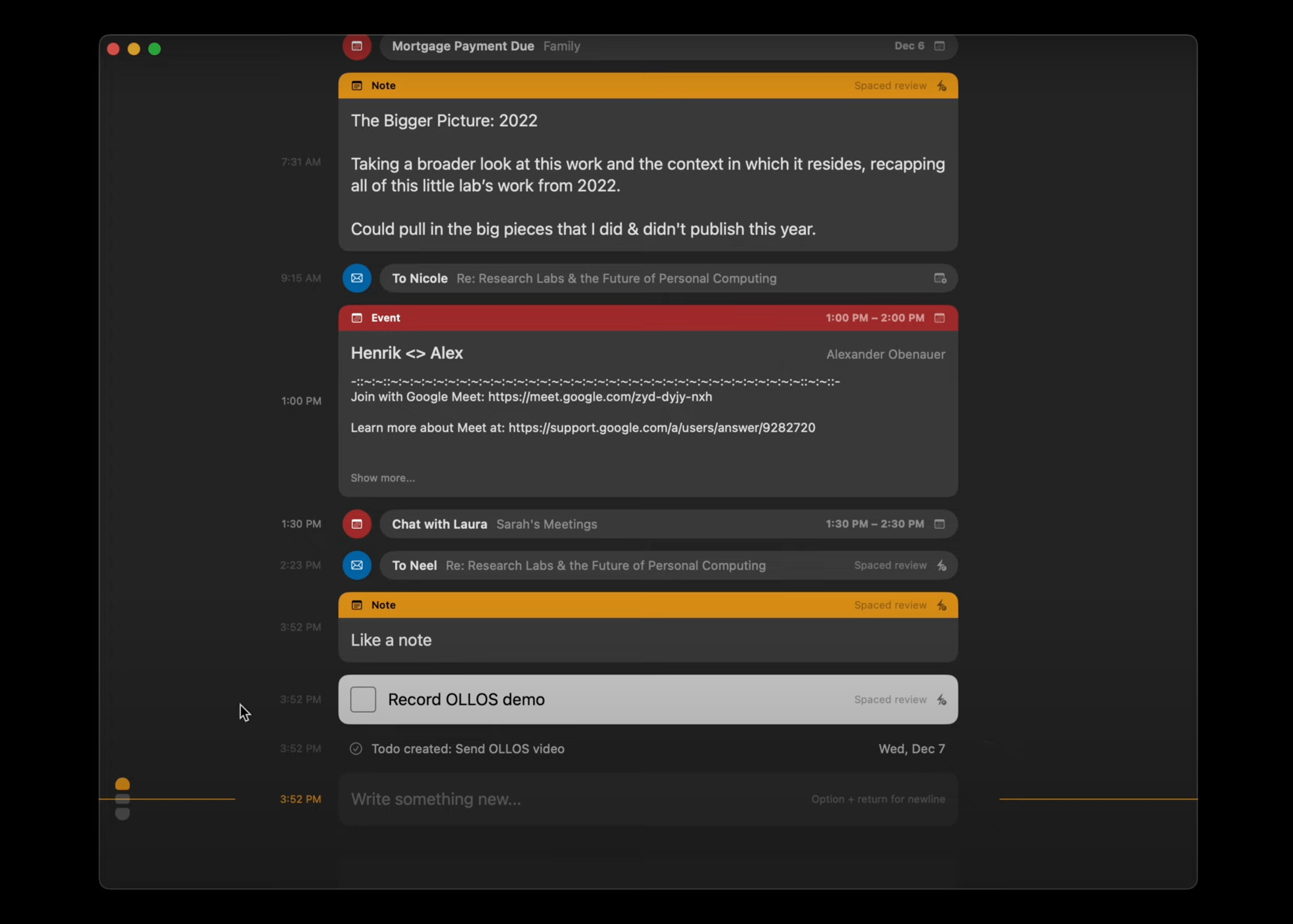OS of the future and universal version control
- February 2024
- Back to archive
Hello all,
New projects are in full swing and we’re getting ready for our first lab summit of this year at the end of next month! In this dispatch, we wanted to spotlight the work of Alexander Obenauer who’s been a Researcher-in-Residence with us since last year and introduce our new research project, in case you’ve missed Adam and Geoffrey’s posts on X.
OLLOS and Workbench by Alexander Obenauer
Alexander Obenauer is exploring how the future of personal computing could better serve people’s lives. You might remember Alexander from the Embark project, where he joined the malleable software team to address the limitations of modern siloed apps. In his independent research, Alexander is questioning today’s operating systems and exploring the OS of the future.
Adopting a new app is the only way for most people to get new interfaces and features into their personal computing environments. This presents users with a funny challenge: surveying pre-made apps for the ones that, hopefully, match the way they think and work. But this is a surprisingly arduous process because apps often operate on their own silo of data, and they present a new, separate environment which must be learned and adopted. When that doesn’t work, people are stuck trying to use software that doesn’t think or work the way they do.
Alexander has been exploring the concept of an “itemized” OS, one that allows users to construct their own environment. In such an OS all of your digital things — emails, todos, notes, reminders, webpages, podcast episodes, and so forth — are “items” that sit in one, local graph. Users are then able to create new interfaces with the items that matter in their lives and work, or introduce items that bring new functionality to their overall environment (such as having a reminder item which can be added to any other item).

OLLOS, one of Alexander’s recent experiments, is an interface that uses time as an organizing principle. Having all of your items organized on one timeline gives you a new dimension of context, as much of our digital things are related to each other by time. A meeting with a colleague involves a calendar event, a related note and maybe a follow-up email. In OLLOS, the temporal association is a benefit of the system. He recently published an essay in which he discusses designing, building, and living in OLLOS for several years, with details on how the design and concept evolved, what future work it points to for timeline interfaces and the OS of the future, and some reflection on personal interfaces like it. Read the essay here.
Workbench, his next project, allows anyone to build personal interfaces on top of the item store that powered OLLOS. This project aims to improve our understanding of the kinds of personal interfaces people want to build and the impact that living in personal interfaces has on people’s lives and work.
Universal version control
The creative process is all about iteration: trying out alternatives, seeing a progression over time, or discussing changes with our collaborators.
Different disciplines use different tools to explore variations, for example:
- Coders use Git to work in branches and see diffs
- Writers use Track Changes in Microsoft Word to suggest and review edits
- Designers duplicate artboards in Figma to see variations side-by-side
Last year, we took inspiration from these versioning systems and built an experimental text editor for writers. We think the core concepts in Upwelling are promising and transferable to other creative domains.
So now, we’re continuing this line of work with version control for writing and beyond. We believe that simple, powerful, universal version control tools could help creative people in many fields work and collaborate more effectively. Perhaps this version control could one day be built into the storage layer of your OS!
Geoffrey Litt, Paul Sonnetag, Max Schoening, Peter van Hardenberg, and Adam Wiggins have started building prototypes to test this idea in our new research project, codenamed Patchwork. Follow the work-in-progress posts in the Patchwork lab notebook.
What’s a few more open tabs?
- Local-First Conf 2024 is the world’s first local-first conference, happening on May 30 in Berlin, Germany. Early bird tickets are going on sale today. Martin Kleppmann, Alex Good, Adam Wiggins and others from the lab will be there, come say hi if you are able to attend.
- For a reminder or quick primer on what local-first is and why it’s important, listen to Peter talk about it in this localfirst.fm episode.
- Geoffrey gave a talk on Tiny Essay Editor, a collaborative markdown editor built on Automerge. We’ve been using it around the lab for all sorts of writing including this dispatch. Here’s a quick summary in slides.
- Lu has recently joined us as a Researcher-in-Residence. They have a channel of slightly-surreal videos on creative coding. The latest one is on Arroost — a playful, mind-boggling music-making tool.
Till next time!